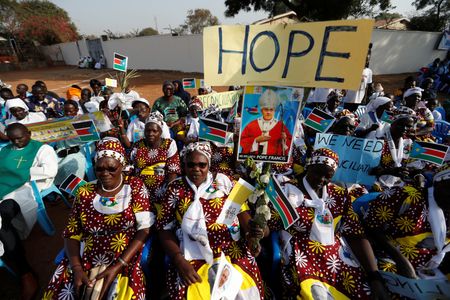By Philip Pullella and Estelle Shirbon
JUBA (Reuters) – Pope Francis on Saturday met South Sudanese children displaced by conflict and heard of the hardships of their lives in camps, telling them they would build a better future for the world’s newest country by replacing ethnic hatred with forgiveness.
The pope was visiting South Sudan with Archbishop of Canterbury Justin Welby and Church of Scotland Moderator Iain Greenshields – an unprecedented joint “pilgrimage of peace”.
The three men led about 50,000 people in an open-air ecumenical prayer vigil at dusk at a mausoleum for South Sudan’s liberation hero John Garang, who died in a helicopter crash in 2005 before the country gained independence.
South Sudan broke away from Sudan in 2011 but plunged into civil war in 2013 with ethnic groups turning on each other. Despite a 2018 peace deal between the two main antagonists, bouts of inter-ethnic fighting have continued to kill and displace large numbers of civilians.
At a meeting in the capital Juba earlier, the Christian leaders listened to testimonies from displaced children including Johnson Juma Alex, 14, who has been living in a camp since 2014 after fleeing his hometown because of fighting.
“Life in the camp is not good because the area is small and crowded,” he told them, reading haltingly from a prepared text in English, which is not his native language.
“There is not enough space to play football. Many children do not go to school because there are not enough teachers and schools for all of us,” he said. After he spoke, the pope, the archbishop and the moderator warmly shook his hand.
There are 2.2 million internally displaced people in South Sudan, out of a total population of about 11.6 million, and another 2.3 million have fled the country as refugees, according to the United Nations.
Extreme poverty and hunger are rife across the country, with two thirds of the population needing humanitarian assistance as a result of conflict as well as three years of catastrophic floods.
‘A FIELD TO PLAY FOOTBALL’
“The future cannot lie in refugee camps,” the pope told the children after hearing their stories at the event, which was held in a prefabricated structure holding about 2,500 people.
“As you said, Johnson, there is a need for all children like yourself to have the opportunity to go to school – and to have a field to play football!”
Francis said hope for South Sudan’s future rests in children from different ethnic groups, who have suffered and are still suffering, yet who do not want to respond to evil with more evil.
“Although conflict, violence and hatred have replaced good memories on the first pages of the life of this republic, you must be the ones to rewrite its history as a history of peace!” he said.
“You bear the burden of a painful past, yet you never stop dreaming of a better future. In our meeting today, we would like to give wings to your hope,” he said.
At the vigil held as night fell at the Garang mausoleum, Welby also addressed the young people of South Sudan, urging them to reject hatred, armed conflict and sexual violence.
“You will not be deceived into war. You will not be forced to kill. You will disagree with others, but still love them,” he said.
“Young men, you will value and honour women, never raping, never violent, never cruel, never using them as if they were there to satisfy desire.”
Welby said he, the pope and the moderator had come to South Sudan as family, to be with the people and share the knowledge of their suffering.
“We have travelled on this pilgrimage of peace in a way that has never been done before because we love South Sudan,” he said, to huge cheers.
On Sunday morning, the three Christian leaders will return to the mausoleum to celebrate Mass, their last major event in South Sudan before leaving the country.
(Writing by Estelle Shirbon, Editing by Alexandra Hudson and Ros Russell)





